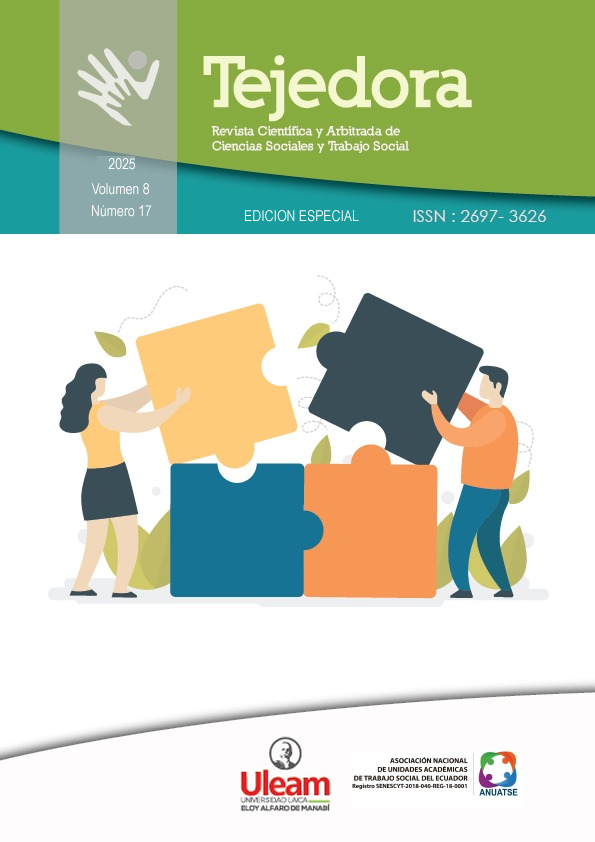COOPERATION BY PARTICIPATION-COLLABORATION AND ITS IMPACT ON RESPONSIBILITY TOWARDS A.M. WITHOUT CHILDREN
DOI:
https://doi.org/10.56124/tj.v8i19.020Keywords:
Older adult, co-responsibility, social equityAbstract
This research sought to determine who bears the responsibility of older adults without children, a social group whose situation is worrying, this problem is well known, the responsibility towards them is not explicitly assumed. They face multiple physical, psychological and emotional needs. The main objective is to determine cooperation through participation and collaboration and its impact on responsibility towards older adults who do not have children in the private gerontológical centers of the Manta canton 2023-24. The methodology used was a mixed approach, integrating quantitative and qualitative techniques for a comprehensive understanding. This study used semi-structured interviews, as well as structured surveys of family members and caregivers, which allow measuring patterns and levels of cooperation. This methodological approach not only sought to describe current practices, but also to propose alternatives that promote a culture of responsibility. The research results reveal that the majority of older adults rely heavily on informal support networks, mainly from friends and distant relatives, which highlights the lack of a structured social responsibility system. It was observed that only 30% of those surveyed reported receiving regular support from close family members, while 50% expressed feeling isolated and neglected. Furthermore, the semi-structured interviews reflected a widespread perception of abandonment and vulnerability, with 70% of participants expressing the need for greater community participation. These findings underline the urgent need to establish policies that strengthen cooperation and responsibility, promoting their participation in local development.
Downloads
References
Fernández, J. (2017). La soledad en adultos mayores sin hijos: un enfoque psicosocial.
Revista de Gerontología, 30(3), 123-130.
Gómez, R. (2019). El impacto del apoyo emocional en la salud mental de los adultos mayores. Revista Española de Geriatría y Gerontología, 55(4), 234-240.
Gutiérrez, M. (2018). Estrategias de intervención emocional en adultos mayores. Psicología y Salud, 29(1), 45-52.
Hernández Sampieri, R., Fernández Collado, C., & Baptista Lucio, M. (2014). Metodología de la investigación. McGraw-Hill.
López, R. A., & Martínez, J. (2021). Análisis del concepto de serenidad en relación con el apoyo psicológico y emocional del paciente crónico. Gerokomos, 31(2), 86-91.
Morales, T., & Rivas, J. (2020). Vínculos sociales y bienestar en adultos mayores sin descendencia. Journal of Aging Studies, 34, 15-22.
Papiol Espinosa, G., Norell Pejner, M., & Abades Porcel, M. (2020). Cooperación y participación en el cuidado de adultos mayores. Gerokomos, 31(2), 86-91.
Rodríguez, A. (2018). Apoyo instrumental y su relación con la calidad de vida de los adultos mayores. Geriatrics, 5(2), 72-80.
Hernández Sampieri, R., Fernández Collado, C., & Baptista Lucio, M. P. (2014). Metodología de la investigación (6ª ed.). McGraw-Hill.
Creswell, J. W. (2014). Research design: Qualitative, quantitative, and mixed methods approaches (4th ed.). Sage Publications.
Flick, U. (2018). An introduction to qualitative research (6th ed.). Sage Publications.
Field, A. (2018). Discovering statistics using IBM SPSS Statistics (5th ed.). Sage Publications.
Braun, V., & Clarke, V. (2006). Using thematic analysis in psychology. Qualitative Research in Psychology, 3(2), 77-101. https://doi.org/10.1191/1478088706qp063oa
Teddlie, C., & Yu, F. (2007). Mixed methods sampling: A typology with examples. Journal of Mixed Methods Research, 1(1), 77-100. https://doi.org/10.1177/2345678906292430
Published
How to Cite
Issue
Section
License
Copyright (c) 2025 Revista Científica y Arbitrada de Ciencias Sociales y Trabajo Social: Tejedora. ISSN: 2697-3626

This work is licensed under a Creative Commons Attribution-NonCommercial-ShareAlike 4.0 International License.






















